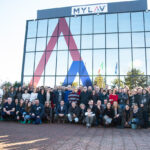Exactly two years after our last interview, we decided to meet again with Dr. Gabriele D’Aloisio, Sole Director of Q Consulting, a company highly qualified in strategic consultancy to companies, to understand how the context in which the company operates today has changed.
by Roberta Imbimbo

Dr. D’Aloisio, how important is the digital training of people today?
In the era of digital transformations, in order to keep up with the times and adapt to the new economic trends underway, companies must necessarily introduce new digital technologies internally, in order to gain a competitive advantage over other market players, to streamline and speed up their production processes, making them increasingly automated, fast and sustainable, to increase company performance, to maximise customer satisfaction, and to improve brand reputation in the reference market. In recent years, even in our country, there has finally been a new awareness of the need to accelerate this very important process of modernisation of the entrepreneurial fabric. Companies have therefore realised the importance of investing not only in cutting-edge technology, but also and above all in the training of human capital. Never as in this period of strong cultural change, in which man remains the fulcrum of this very important epochal revolution, do we need suitably trained figures who are able to develop innovative business approaches, use increasingly innovative and interconnected digital tools, and proactively anticipate the needs of a dynamic market in constant evolution. The possibility of delegating the most repetitive and standardised work to technology leads to the empowerment of people, provided they acquire the right skills to deal with this evolution effectively. Companies must therefore transform their people and encourage the improvement of their skills and the development of new, highly specialised digital know-how in order to continue to innovate and remain competitive in their market.
In this operational context, over all these years, the 4.0 training tax credit has been the driving force for new professionalisation in companies that want to cope with the digital transition.
Exactly. The aim of this measure is to support companies in the process of technological and digital transformation by creating or consolidating skills in the enabling technologies necessary to implement the 4.0 paradigm. In detail, the bonus is configured as a tax credit that allows companies to recover expenses for training their workers. For the fiscal year 2022, the tax credit was granted for 70 per cent of eligible expenses, with a maximum annual limit of EUR 300,000 for small companies, and for 50 per cent of eligible expenses, with a maximum annual limit of EUR 250,000 for medium-sized companies. Large enterprises could benefit from a tax credit of 30% of eligible expenses, with an annual ceiling of EUR 250,000. All companies were eligible for the Bonus Formazione 4.0, without any constraints, regardless of their legal form or the sector they belonged to or the accounting regime they used. The only condition was that they had to comply with current workplace safety regulations and had to comply with the laws governing the payment of social security and welfare contributions for employees.

Planned to last until 2022, has this measure been refinanced by the government?
Unfortunately not! A serious handicap considering that the future will be increasingly digital and considering that Italy is fourth to last in Europe in terms of digital literacy (according to the Piaac-Ocse survey, in the three-year period 2019-2022, 28% of the population between the ages of 16 and 65 is functionally illiterate).A serious problem from many points of view, personal, economic and political: in a world where digital technologies can improve the efficiency and effectiveness of services, resisting change means falling behind and paying a very high price. Among other things, it is truly paradoxical that the government on the one hand has instituted the tax credit for investments in tangible capital goods 4.0, but on the other hand has not refinanced training for the use of these latest generation machines. It is therefore to be hoped that a fundamental measure will be refinanced in our country to enable companies to continue to invest in new technologies and become connected and digital Smart Factories, and for Sistema-Italia to become decidedly more competitive at the European level.
How have Covid and the war in Ukraine changed your operating environment?
The aftermath of Covid and the war in Ukraine are putting a strain on the economies of Western countries (and beyond) due to the explosion in the costs of energy, transport, raw materials, and the consequent inflationary effects at three hundred and sixty degrees. The result? A probable slowdown in growth that could have vio-lent macro-economic repercussions for Italian companies. A slowdown linked to the sanctions against Russia, the climate of uncertainty, market volatility, and a lack of liquidity that squeezes the market and investments. Since the primary objective of Q Consulting is to provide strategic business consulting to enable SMEs to achieve excellence, supporting them in managing their business models with a completely innovative approach (aimed at making their production processes more efficient, increasing their productivity, granting FA for their investments), you will well understand that this particular moment is inevitably affecting our business as well. There is no magic formula to get out of the crisis. It is only possible to create a plan of action and reaction for proper risk management. So, returning to the importance of modernisation, I am increasingly convinced that the winning solutions must be ‘quick and smart’. We must rethink the future in a new and more conscious way, focusing more and more on process and product innovation, the use of arti-ficial intelligence and highly skilled personnel to successfully meet the future challenges imposed by ever-increasing globalisation and the new geo-political, economic and social Euro-pean scenarios.
























































